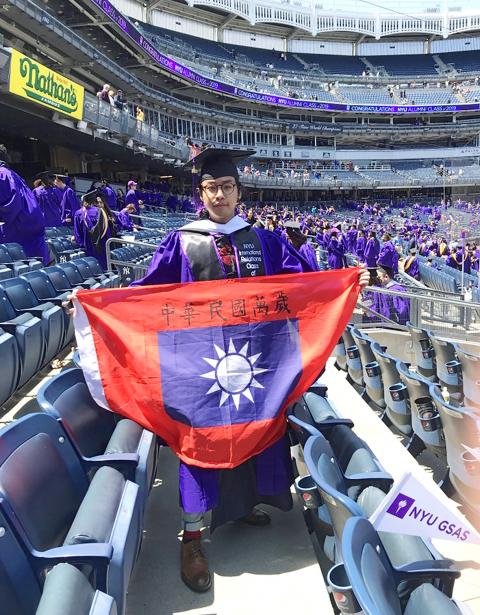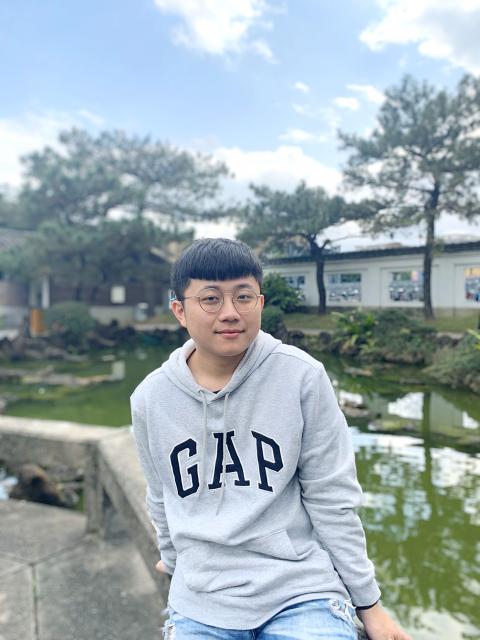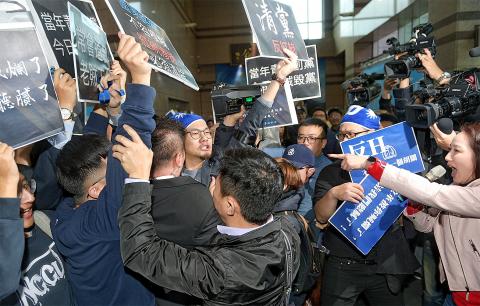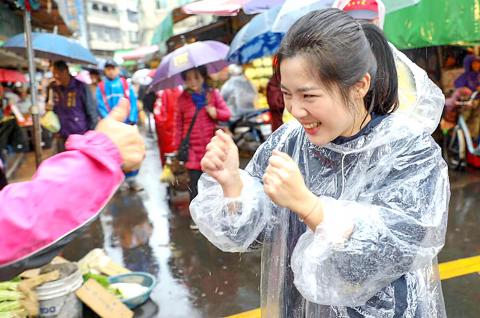Lin Chia-hsing (林家興) is a 29-year-old with aspirations for the future and a head full of new ideas and political ideals. He has been a paid-up member of the Chinese Nationalist Party (KMT) for 10 years now, although he is not the kind one would normally associate with the image of today’s KMT.
Lin joined the party in 2010, during former president Ma Ying-jeou’s (馬英九) first term in office, when the KMT was still seen as a reformist party pursuing an anti-corruption agenda.
A decade on, and the party’s image is somewhat tarnished. Even the two candidates for the March 7 party chairmanship contest had to admit that the KMT’s image was old, pro-Chinese communist and drastically in need of reform.

Photo courtesy of Lin Chia-hsing
When Johnny Chiang (江啟臣) won the chairmanship, Lin wished him luck, but stopped short of offering congratulations. For Lin, the party has become plagued by deep-rooted interests, and real reform will require hacking through these gnarly roots, while persuading them it’s all for their own good.
“The KMT is no longer the party it used to be. It’s lost its political vision for the nation and in what direction it wants to take the Republic of China (ROC). If it doesn’t make this clear, it’s going to be difficult for the party to persuade the electorate.”
For Kuang Po-teng (匡伯騰), 37, a lawyer who joined the party around four years ago, KMT reform will need to start right from the very basics of its vision for the nation. The KMT, he says, has changed from being its anti-communist self in days gone by to its present incarnation as a virtual byword for a pro-Chinese communist stance. This, according to Kuang, is due to the party’s failure to clearly articulate its national vision.

Photo courtesy of Wang Ching-lun
“During the era of Chiang Kai-shek (蔣介石) and Chiang Ching-kuo (蔣經國), the KMT was about ‘liberating its compatriots in China, and uniting the country under the doctrine of the three principles of the people.’” The ”1992 consensus” of the KMT today, he adds, is a mechanism for interacting with the other side of the Taiwan Strait, “but who knows where these ties are going to take the ROC? The KMT has yet to make this clear.”
At 48 years old, Johnny Chiang is the KMT’s youngest ever chairman. Yet, it doesn’t necessarily follow that he appeals most to the younger generation in the party.
According to an online opinion poll conducted on Feb. 21 and 22 by the online media outlet Formosa, only 47 percent of respondents believed that the successful candidate would have any bearing on the party’s future, and of those with a preferred candidate, Chiang’s rival for the chair, former party vice chair Hau Lung-bin (郝龍斌), who is almost 70, actually fared slightly better among those in the under 40-year-old age group. Chiang enjoyed significantly more support — over 40 percent for Chiang, compared to less than 10 percent for Hau — in the 60-69-year-old age group.

Photo: Chang Chia-ming, Liberty Times
This suggests that the biggest problem for the Chiang right now is the level of engagement with the party of the younger generation in general, and with their enthusiasm for his leadership in particular.
Wang Ching-lun (王竟倫), 22, who joined the KMT at 18, puts it this way: “It’s not that young people have abandoned the KMT; it’s that the KMT has abandoned young people.”
The KMT still has young supporters, and many of these support the ROC and the ideal of the KMT safeguarding a free China.

Photo taken from Hsu Chiao-hsin’s Facebook page
Wang pointed out that the thing the younger generation is most concerned about is that “our generation grew up in a democracy, and we are worried about whether the KMT is the pro-Chinese communist political party in Taiwan. The KMT was not pro-communist China before, it was always the anti-communist party, the party that defended democracy and liberty.” Now, however, the Democratic Progressive Party is the party seen as protecting democratic freedoms, not the KMT.
During the peak of the anti-extradition protests in Hong Kong, KMT Legislator Chiang Wan-an (蔣萬安) posted a message on his Facebook page in support of young Hong Kongers and students, adding that “Taiwan has no place for ‘one country, two systems.’”
Few KMT politicians chose to comment on this, and Wang found this very puzzling. Since Chiang Wan-an had voiced this idea, why did so many of his party colleagues choose to keep quiet about it?
According to Kuang, “being pro-China is not the problem: being pro-Chinese communist is.”
For Kuang, the KMT should be the party of the Greater China area, whether this be based on its anti-Chinese communist past or its democratic aspirations, or simply playing the role of the opposition party in Taiwan. Regardless, it should not be Beijing’s “yes man.” He says that having cross-strait relations is fine, but the KMT has to clearly articulate how it intends to protect the ROC. In the same way, the rules of engagement for cross-strait relations must be set out clearly.
“For example, when they attack the ‘comprador culture,’ they need to say exactly what they mean by that. What exactly is a comprador? … Johnny Chiang defines it as mixing business and politics, which should not happen within the party, so does he mean that party representatives or party workers should not engage in commercial activities? Then what about Taiwanese businessmen in China representing the KMT over there? Should that practice be abolished?”
Taipei City Councilor Hsu Chiao-hsin (徐巧芯), 30, joined the party in 2012. She says that the culture of vested interests within the party of members who trade their political influence in Taiwan for preferential trade arrangements with China have been very damaging to the KMT’s image. For her, the point is not so much to prohibit Taiwanese business people in China from joining the party, but the party needs to adjust the proportion of party representatives or workers engaged in commercial enterprises.
“It’s not that it shouldn’t be allowed, but the composition and deployment of members of the Central Standing Committee needs to reflect the needs of ordinary people. Only then will the KMT be able to return to power.”
The party oath, which everyone needs to take before they can become a party member, includes the line: “I sincerely swear that I will join the party and trust in the three principles of the people…and strive to realize the creation of a free, democratic, just, unified ROC.”
As Lin puts it, the party that started out as a revolutionary party now needs a return to that revolutionary spirit: mere reform won’t cut it.

Jacques Poissant’s suffering stopped the day he asked his daughter if it would be “cowardly to ask to be helped to die.” The retired Canadian insurance adviser was 93, and “was wasting away” after a long battle with prostate cancer. “He no longer had any zest for life,” Josee Poissant said. Last year her mother made the same choice at 96 when she realized she would not be getting out of hospital. She died surrounded by her children and their partners listening to the music she loved. “She was at peace. She sang until she went to sleep.” Josee Poissant remembers it as a beautiful

Before the last section of the round-the-island railway was electrified, one old blue train still chugged back and forth between Pingtung County’s Fangliao (枋寮) and Taitung (台東) stations once a day. It was so slow, was so hot (it had no air conditioning) and covered such a short distance, that the low fare still failed to attract many riders. This relic of the past was finally retired when the South Link Line was fully electrified on Dec. 23, 2020. A wave of nostalgia surrounded the termination of the Ordinary Train service, as these train carriages had been in use for decades

Lori Sepich smoked for years and sometimes skipped taking her blood pressure medicine. But she never thought she’d have a heart attack. The possibility “just wasn’t registering with me,” said the 64-year-old from Memphis, Tennessee, who suffered two of them 13 years apart. She’s far from alone. More than 60 million women in the US live with cardiovascular disease, which includes heart disease as well as stroke, heart failure and atrial fibrillation. And despite the myth that heart attacks mostly strike men, women are vulnerable too. Overall in the US, 1 in 5 women dies of cardiovascular disease each year, 37,000 of them

Politically charged thriller One Battle After Another won six prizes, including best picture, at the British Academy Film Awards on Sunday, building momentum ahead of Hollywood’s Academy Awards next month. Blues-steeped vampire epic Sinners and gothic horror story Frankenstein won three awards each, while Shakespearean family tragedy Hamnet won two including best British film. One Battle After Another, Paul Thomas Anderson’s explosive film about a group of revolutionaries in chaotic conflict with the state, won awards for directing, adapted screenplay, cinematography and editing, as well as for Sean Penn’s supporting performance as an obsessed military officer. “This is very overwhelming and wonderful,” Anderson